It was another hot Saturday in the warehouse. The volunteers helped move and sort the donated goods into bags, tying and securing the packages. Priests, nuns, and representatives of parishes, orphanages, and private organizations showed up in borrowed trucks, old cars, a taxi, etc. After accomplishing the paperwork, they were off carrying milk, bread, soap, and other goods to their respective underserved communities.
Why would they trek to this warehouse in Marcos Alvarez town in Las Piñas (Philippines) every Saturday, some coming from far off? The warehouse serves as the operations hub of the Philippine Food Bank Foundation Inc. The objective: feeding and providing for the marginalized, while putting to good use what would otherwise be “wasted” quality goods.
Carrying Out Pope Francis’ Exhortation
Pope Francis coined the term “culture of waste” during his World Environment Day address on June 5, 2013.
“Let us remember well, that whenever food is thrown out it is as if it were stolen from the table of the poor, from the hungry!"
-Pope francis
"I ask everyone to reflect on the problem of the loss and waste of food, to identify ways and approaches which, by seriously dealing with this problem, convey solidarity and sharing with the underprivileged,” the Pope said.
Addressing this issue and sustaining the effort would require more than just a few eager volunteers. It would need an organization. Thus, the Philippine Food Bank Foundation Inc. was born (https://foodbank.org.ph).

Nowadays, most needs and wants can be met instantaneously with delivery apps and online shopping. Not so for the country’s underprivileged and poor. They are trapped in a rut, unable to find opportunities to help themselves. The Food Bank would serve as a bridge from the suppliers to them.
The Birth of the Food Bank
It was on the 4thof November 2016, in a meeting at the University of Asia and the Pacific, that Dr. Bernie Villegas, Dr. Lito Sandejas, Jimmy Ladao, Itong Torres, and Danny Navarro established the Philippine Food Bank Foundation. The idea was to approach socially-responsible food companies and ask them to donate their soon-to-expire but still very edible products to serve undernourished Filipino families. The Philippine Statistics Authority reports that this sector comprised 21% of the population in 2018.
The first donor company came in February 2017: Alaska Milk Philippines. The milk products were distributed to communities in Laguna. More donor companies subsequently joined the cause and the variety of goods has grown. There are baked products from Krispy Kreme, Starbucks, and Dunkin’ Donuts; toiletries from P&G, Colgate Palmolive, and Unilever; juice from Del Monte; egg whites from Mary Grace, and more.

Utilizing parishes, religious congregations, charitable institutions and private organizations to distribute the goods, the Food Bank reaches informal settlers in depressed urban and rural areas. It benefits orphanages, public school children, homes for the elderly, and feeding centers in Metro Manila and the provinces.
After 3 years of operation, the Food Bank has a distribution network consisting of 150 groups nationwide, reaching some 3 million beneficiaries from Aparri in the north to Marawi in the south.
Sustained Growth
Recipient communities would email the Food Bank to express gratitude, narrate their experiences, and send photos. It is not infrequent for them to express their pleasant surprise upon receiving milk, donuts, pastries and food items that they had seen in advertisements, but never imagined they would ever have. It is said that “a picture paints a thousand words” but a thousand words cannot describe the happiness written in the faces of children who receive the unexpected treats.
“Give without counting the cost, and always for God. In this way you will live, even humanly speaking, closer to the rest of humanity, and you will make your contribution.”
- St. Josemaria Escriva

St. Josemaria Escriva wrote in no. 27 of Furrow: “Give without counting the cost, and always for God. In this way you will live, even humanly speaking, closer to the rest of humanity, and you will make your contribution.” This and Pope Francis’s 2013 message on World Environment Day are the guiding principles sustaining the efforts of the Food Bank.
As long as the warehouse in Marcos Alvarez stands, the organizers, volunteers, donors and distributors will stand in solidarity in order to share more smiles and food with communities in need.
